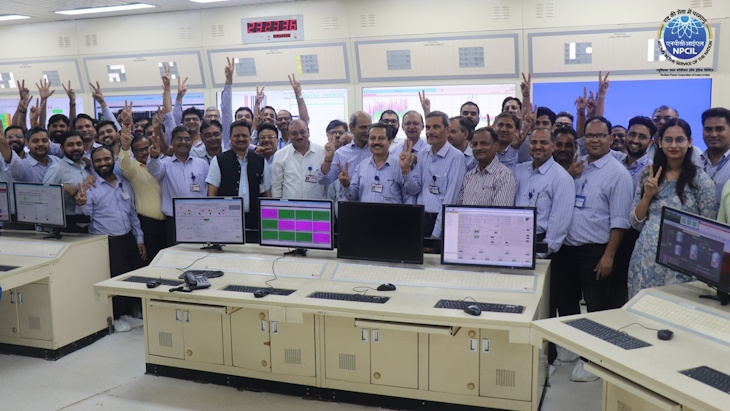First criticality marks the completion of the construction phase and the start of the operational phase, Nuclear Power Corporation of India Ltd (NPCIL) said. The unit will now undergo various tests before it is connected to the grid. Its power will then be raised, in steps, until it reaches full power - a process known as power ascension testing - with clearance from the Atomic Energy Regulatory Board at each step.
Fuel loading at Rajasthan Atomic Power Plant unit 7 - or RAPP-7 - began on 1 August, and the unit now joins Kakrapar 3 and 4 in India's fleet of 700 MWe pressurised heavy water reactors (PHWRs). Kakrapar 3 achieved first criticality in July 2020, was connected to the grid in January 2021 and was declared to be in commercial operation in July 2023. Kakrapar 4 reached first criticality in late December 2023, was connected to the grid in February and declared in commercial operation at the end of March.
"The successful achievement of criticality of RAPP-7, after the smooth operation of the first two 700 MW PHWRs … at Kakrapar in Gujarat, demonstrated the maturity achieved by NPCIL in the design, construction and operation of the indigenous 700 MW PHWRs," NPCIL said.
The Rajasthan plant is already home to six operating PHWRs with a total capacity of 1180 MW. A second 700 MW PHWR - RAPPS-8 - is also under construction and is expected to start generation next year.
As well as Rajasthan units 7 and 8, four Russian-supplied VVER pressurised water reactors are under construction at NPCIL's Kudankulam site in Tamil Nadu. Site works are also under way for the construction of two 700 MW units Gorakhpur in Haryana. In addition to these, a 500 MWe Prototype Fast Breeder Reactor is being built by BHAVINI at Kalpakkam in Madras.
Ten further 700 MW PHWRs have received administrative approval and financial sanction: Kaiga units 5 and 6 in Karnataka; Gorakhpur units 3 and 4 in Haryana; Chutka units 1 and 2 in Madhya Pradesh; and Mahi Banswara units 1 and 2 and units 3 and 4 in Rajasthan. The Indian government recently approved the transfer of the project to build four 700 MWe PHWRs at Mahi Banswara to NPCIL and National Thermal Power Corporation's Ashvini joint venture.















